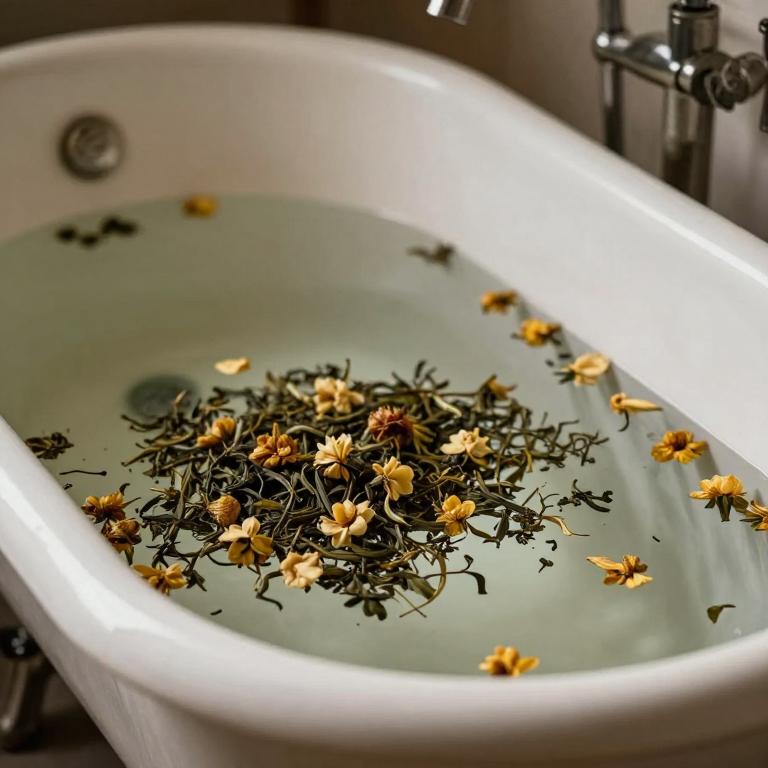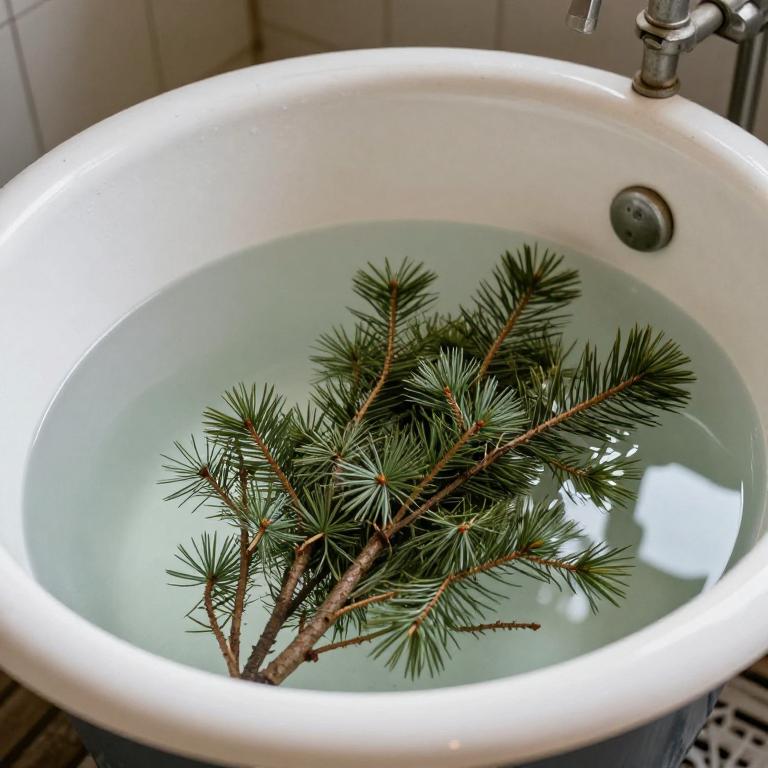10 Best Herbal Baths For Cough

Herbal baths can be a soothing and natural remedy for relieving cough symptoms by promoting relaxation and easing respiratory discomfort.
Certain herbs such as eucalyptus, peppermint, and lavender are commonly used in herbal baths due to their decongestant and anti-inflammatory properties. Adding these herbs to warm water can help open up airways and reduce mucus buildup, making breathing easier. The steam from the bath also helps to moisturize the airways and soothe irritated tissues.
While herbal baths are not a substitute for medical treatment, they can provide symptomatic relief and support overall wellness during a cough.
Table of Contents
- 1. Eucalyptus (Eucalyptus globulus)
- 2. Thyme (Thymus vulgaris)
- 3. Peppermint (Mentha piperita)
- 4. Salvia (Salvia officinalis)
- 5. Rosemary (Rosmarinus officinalis)
- 6. Ginger (Zingiber officinale)
- 7. Camellia (Camellia sinensis)
- 8. Scots pine (Pinus sylvestris)
- 9. Chamomile (Matricaria chamomilla)
- 10. English lavender (Lavandula angustifolia)
1. Eucalyptus (Eucalyptus globulus)

Eucalyptus globulus, commonly known as the Australian eucalyptus, is often used in herbal baths to help alleviate symptoms of coughing due to its aromatic and anti-inflammatory properties.
When added to warm water, the essential oils from eucalyptus globulus can be inhaled, helping to open up the airways and reduce congestion. The steam from the bath enhances the absorption of these beneficial compounds, promoting respiratory relief. This natural remedy is particularly effective for dry or productive coughs, offering a soothing and relaxing experience.
However, it is important to use caution and dilute the oils properly to avoid skin irritation.
2. Thyme (Thymus vulgaris)

Thymus vulgaris, commonly known as thyme, has been traditionally used in herbal baths to alleviate symptoms of cough due to its antimicrobial and expectorant properties.
When added to warm water, thyme essential oil or dried thyme leaves can help soothe irritated airways and reduce mucus buildup, providing relief from persistent coughing. The aromatic compounds in thyme, such as thymol, may also have a calming effect on the respiratory system, promoting easier breathing. Herbal baths with thyme are often recommended as a complementary therapy for those seeking natural remedies for coughs.
However, it is important to consult with a healthcare professional before using thyme baths, especially for individuals with sensitive skin or existing respiratory conditions.
3. Peppermint (Mentha piperita)

Mentha piperita, commonly known as peppermint, has been traditionally used in herbal baths to alleviate symptoms of cough by promoting respiratory relief and easing congestion.
The essential oils in peppermint, particularly menthol, have cooling and soothing properties that can help reduce inflammation in the airways and ease the sensation of coughing. When added to warm water, peppermint herbal baths can help open up the nasal passages and improve breathing, making them a natural remedy for those suffering from cough-related discomfort. This method is especially beneficial for individuals seeking a gentle, non-pharmacological approach to managing cough symptoms.
However, it is important to use peppermint in moderation and consult a healthcare professional if symptoms persist or worsen.
4. Salvia (Salvia officinalis)

Salvia officinalis, commonly known as sage, has been traditionally used in herbal baths to alleviate symptoms of cough by leveraging its anti-inflammatory and antiseptic properties.
When infused into bath water, sage can help soothe irritated respiratory passages and reduce mucus production, providing relief from persistent coughing. The warm water of the bath enhances the absorption of sage’s essential oils, promoting relaxation and easing respiratory discomfort. This natural remedy is particularly beneficial for those seeking a gentle, holistic approach to managing cough symptoms without harsh pharmaceuticals.
Incorporating sage into a bath routine can also help improve overall respiratory health and support the body’s natural healing processes.
5. Rosemary (Rosmarinus officinalis)

Rosmarinus officinalis, commonly known as rosemary, has been traditionally used in herbal baths to alleviate symptoms of cough by promoting respiratory health and easing congestion.
The essential oils extracted from rosemary leaves contain compounds like cineole and camphor, which have expectorant and antispasmodic properties that can help loosen mucus and soothe irritated airways. When added to a warm bath, rosemary's aromatic compounds are absorbed through the skin, potentially reducing inflammation and improving breathing. This natural remedy is often recommended for its calming effects, which can help relieve stress-related coughing and enhance overall relaxation.
However, it is important to dilute rosemary essential oil properly and consult with a healthcare professional before using it, especially for children or individuals with sensitive skin.
6. Ginger (Zingiber officinale)

Zingiber officinale, commonly known as ginger, has been traditionally used in herbal baths to alleviate symptoms of cough by promoting respiratory health and reducing inflammation.
When added to warm water, ginger releases volatile oils and compounds such as gingerol, which have warming and soothing effects on the respiratory tract. The aromatic steam from the bath can help open up airways and ease congestion, making it beneficial for individuals suffering from persistent coughs. This natural remedy is often preferred for its gentle, non-invasive approach to symptom relief.
While it may not cure the underlying cause of a cough, ginger herbal baths can provide comfort and support during recovery.
7. Camellia (Camellia sinensis)

Camellia sinensis, commonly known as the plant from which green and black tea are derived, has been traditionally used in herbal remedies for its potential therapeutic properties.
While it is not typically used as a bath ingredient, some alternative practitioners suggest infusing Camellia sinensis leaves into bath water to harness its calming and mild antiseptic qualities. This herbal bath may help soothe respiratory discomfort and ease coughing by promoting relaxation and reducing inflammation in the airways. However, it is important to note that there is limited scientific evidence supporting the effectiveness of Camellia sinensis baths for treating coughs.
As with any herbal remedy, it is advisable to consult a healthcare professional before using it, especially for individuals with underlying health conditions or allergies.
8. Scots pine (Pinus sylvestris)

Pinus sylvestris, commonly known as Scots pine, has been traditionally used in herbal baths to alleviate symptoms of cough by leveraging its anti-inflammatory and expectorant properties.
The essential oils extracted from the needles of this evergreen tree contain compounds like pinene and camphor, which can help loosen mucus and soothe irritated airways when used in a warm bath. To prepare a pine herbal bath, a handful of dried Scots pine needles or a few drops of pine essential oil can be added to warm water, allowing the aromatic compounds to diffuse into the air and be inhaled. The calming effect of the scent, combined with the relaxing properties of a warm bath, can help reduce coughing fits and promote respiratory ease.
This natural remedy is often recommended for those seeking a gentle, holistic approach to managing cough symptoms without harsh pharmaceuticals.
9. Chamomile (Matricaria chamomilla)

Matricaria chamomilla, commonly known as chamomile, is a gentle herbal remedy often used in baths to soothe respiratory discomfort and ease coughing.
When infused into bath water, chamomile releases calming compounds that may help reduce inflammation in the airways and ease irritation. The warm water combined with the soothing properties of chamomile can promote relaxation and ease the tension that often accompanies a persistent cough. This type of bath is particularly beneficial for individuals seeking a natural, non-invasive approach to respiratory relief.
However, it is important to consult with a healthcare provider before using chamomile baths, especially for children or those with allergies or existing medical conditions.
10. English lavender (Lavandula angustifolia)

Lavandula angustifolia, commonly known as English lavender, has been traditionally used in herbal baths to soothe respiratory discomfort and alleviate symptoms of cough.
The aromatic compounds in lavender, such as linalool and linalyl acetate, possess calming and anti-inflammatory properties that may help reduce irritation in the respiratory tract. When added to warm water in a bath, lavender essential oil can promote relaxation and ease breathing, making it a beneficial complementary therapy for cough relief. Herbal baths with lavender are often recommended for their soothing effects on the lungs and their ability to reduce stress, which can exacerbate coughing.
However, it is important to dilute the essential oil properly and consult with a healthcare provider, especially for those with sensitive skin or chronic respiratory conditions.